Nobeltec TimeZero app 2015, Furuno DRS4W WiFi radar overlay & more!
Yes, iPad navigation fans, that is Furuno 1st Watch WiFi Radar overlaid on the Nobeltec TimeZero charting app. I wasn’t even sure that an iPad could overlay radar over a simple vector chart, but here it is over a finely rendered raster chart blended with hi-res satellite photos. This is virtually the same mix of navigation data that I’ve found so useful on a Furuno TZT and the short demo file I saw running in Fort Lauderdale suggested that it may pan and zoom (and even go 3D) almost as smoothly on an iPad. It’s a major advance in tablet navigation, I think, but the TimeZero app update coming next spring has more to brag about…
The Nobeltec announcement that went online today is titled TimeZero App Compatibility with FURUNO DRS4W Radar & AIS, but there’s actually more to it than that. After the update the standard version of TimeZero — which already impressed me and costs $40 to $50 depending on the (large) chart region you choose — will be able to receive some basic boat data like GPS and Heading coming over WiFi. (And they hope to give TZ the ability to accept and display more basic data like Depth, Wind, and Temperature eventually.) Buy a $10 add-on software module — right in the app, just like you buy the charts — and TZ will also display AIS targets coming over the same WiFi connection. Finally, if you have a Furuno DRS4W radar, a $50 module enables overlay and full radar control.
The diagram above shows how you could use all of TimeZero’s new capabilities at once. The 1st Watch Radar with its fixed WiFi name (SSID) and password acts as the central access point, so whatever WiFi bridge you use to send out Heading, AIS, etc. from the boat system must be able to join a network, not just create one. But this feature is becoming more common, like with the Vesper XB8000 AIS transceiver that has recently been distributing AIS, Depth, Wind, etc. via Gizmo’s own WiFi router. At any rate, picture the above diagram with a Vesper bridge/transponder plus a few sensors and instrument displays. I see a pretty powerful yet economical navigation package running on the two iPads a DRS4W will support with no MFD onboard. I’m not saying I want to go that way myself, but some boaters do, and this is exactly the scenario that Furuno’s standalone WiFi Radar concept seemed to hunger for. (Note that Furuno and Nobeltec do have a relationship.)
It’s also possible to use the TZ app simply with the WiFi Radar, as Nobeltec says the overlay will sync to charts OK with COG (Course over Ground) instead of Heading if you’re going over 1 knot. They highly recommend Heading, though, and apparently the compass built into iPads isn’t up to the task.
A third possible diagram would show the iPad hooked directly to a boat’s WiFi data access point, without a WiFi radar. So the updated TimeZero should see some Vesper data streaming from Gizmo’s router, AIS included if I add the module. And I’ll bet the TZ app does good AIS target plotting, like its MFD and PC sisters. But perhaps I’m getting ahead of myself. Besides the announcement, Nobeltec has a detailed TZ/DRS4W/AIS FAQ for download and they promise a list of compatible WiFi bridges when the update materializes sometime next spring. Who’s now more interested than ever before in Furuno’s WiFi Radar and/or the Nobeltec TimeZero app?


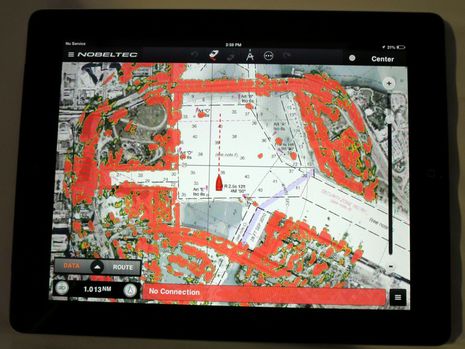
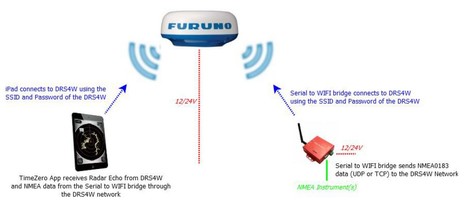
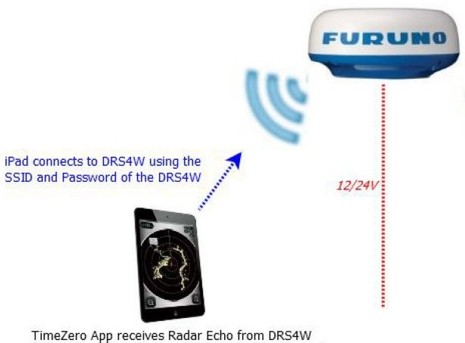
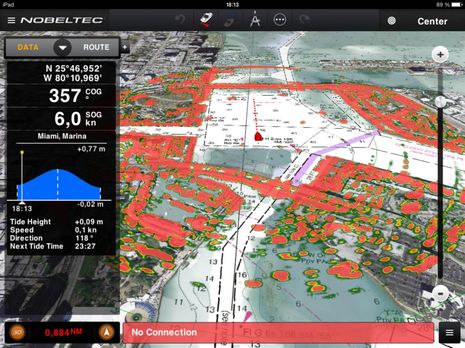
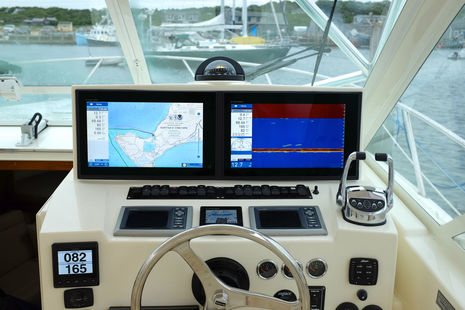
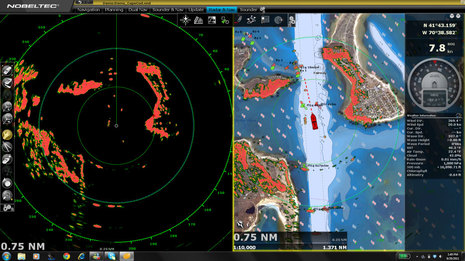
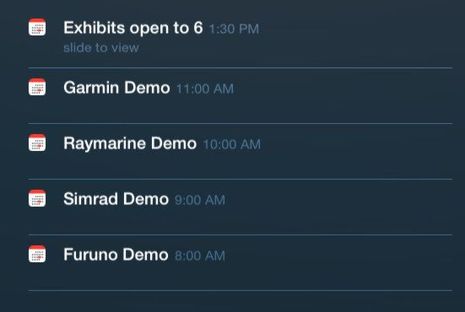
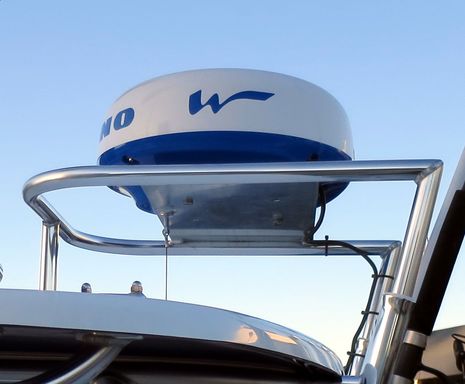








Using the iPad as a display would be fine if only I could see it in the sunshine on my FB. And a touchscreen is a bit tough to use when planing in choppy water. Give me a trackball!
Bob
If they can do this with the TZ app, then they should be able to make it work with the Trident Desktop app. Now THAT would be huge! I imagine though that it will never happen, as they will see it as hitting them in the foot for Insight sales, and Furuno will see it as cannibalizing potential DRS radar sales, not to mention the plug-in licencing.
I personally see it as a potential big sale item to the smaller boaters who are looking for a PC system, might be playing with OpenCPN and the radar plug-ins, but want more features and a company behind their system choices.
Oh well, one can always dream.
This is great! If it eventually works with OpenCPN all the better. I’m a big fan of PC navigation and hope this trend continues.
Today I learned that Tom MacNeil — a PNW installer who has set up a lot of boats with iPad navigation using iNavX and a Brookhouse iMux — may soon put together a system that includes the Furuno WiFi radar.
He was hoping that iNavX and the iMux could work together transparently through the DRS4W so the client could flip back and forth between iNavX and the Furuno Radar app, but it looks like the iMux needs some router settings help to act as a bridge. Brookhouse PDF here: http://goo.gl/UJt7On
Can anyone suggest a NMEA 0183 multiplexer with WiFi that can simply be told to join an existing network (like the Vesper XB8000)? Tom’s also hoping it can smoothly transport autopilot commands from iNavX, which the iMux is apparently quite good at.
PS: Tom (and his client) may like the TimeZero update when it comes out, but he has been a hardcore iNavX fan at least since this 2010 Panbo entry: http://goo.gl/aK9I9b
Makes me wonder how they can do this on a device that is mm’s thin, yet their TZT displays are a foot thick. 🙂
The iMux can be set up in many different ways, it is purely a matter of which settings/features are made available to the user. Most users are not network specialists and as mistakes in network configuration are easily made we pre-configure the iMux to work as an access point with unique SSID and unique WPA2 passphrase, just like the DRS4W. An important consideration from our point of view is the amount of time spent on support. Therefore, the motto is “the simpler the better”.
So far WDS has worked well for users who want to integrate the iMux with an existing network, but we can offer different modes for integration with the DRS4W (and other on-board networks) and make the necessary settings available to the user.
The iMux can be set up as follows:
1. Establish the wifi connection with the DRS4W (join the network), using the provided unique DRS4W SSID and WPA2 password and fixed IP address (172.31.3.100 as recommended by Nobeltec)
2. Act as a server supporting up to 16 TCP sessions, TCP port number 10110 (NMEA data) for connection (via the DRS4W) of up to 16 iPads/iPhones, computers (Windows and Mac) and Androids.. Note that we always use TCP, not UDP. UDP is not a safe protocol that detects data-loss, which can be dangerous in case of AIS target data.
We can supply the iMux at this moment with SSID, password and ip address pre-configured. We would need this data when ordered so the iMux will connect automatically with the given DRS4W, i.e. 100% “plug and play”.
In the near future we will make the parameters user-selectable using a proprietry NMEA sentence with the following format:
$PIMUX,ssid,passphrase,ipaddress,mask
A second proprietry NMEA sentence will reset the iMux to AccessPoint mode with settings as in all shipped units at present. (ssid: Brookhouse_iMux_xxxx, WPA2: Brookhousennnnnnnn, where xxxx and nnnnnnnn are unique):
$PIMUX,AP
The NMEA sentences can be sent via any of the iMux input ports, using a computer with a terminal program, like Teraterm (free). This only needs to be done once, the parameters are saved in the iMux.
Besides TimeZero, the user can run any app on the i-device (popular ones like iNavX, NMEA Remote, iRegatta), Android and any nav software on PC (incl OpenCPN) or MAC (like MacENC) through the DRS4W or other network/router.
Ben, thanks for your cogent review. I guess we are still looking for someone who has used the TZ app with the DRS4W. Also, clicking on your link to Nobeltec announcement says “The requested URL /archives/2014/12/TimeZero App Compatibility with FURUNO DRS4W Radar & AIS was not found on this server.” Is Nobeltec having second thoughts?
Ben — I hope you are working on a big writeup of the new Furuno TZT 2. Looking forward to seeing your commentary. I was literally just about to install two new TZT14s in my boat, now of course I have to consider possibility of holding out for TZT 2.
Definitely, Quitsa. TZT2 looks like a smartly thought-out evolution/alternative to TZT. Interesting tidbit for now: It’s running on Android, not Windows!
http://www.navnet.com/tzt2/en/
The new FI-70 glass instrument display seems nice too:
http://www.furunousa.com/products/ProductDetail.aspx?product=FI70
That is a very interesting tidbit indeed about the operating system. It should open up a whole range of possibilities for features if Furuno allows “app developers” to get access. Also should help enhance performance I should think, especially in a touch screen environment.
Are there any instructions available for us common folks to use. I am struggling with bridging my iMux with my JetPack MiFi.
Matthew, besides the FAQ I linked to at the end of the entry above, Nobeltec has some good dope on setting up the WiFi radar here:
http://app.nobeltec.com/how
Detail on iMux WiFi integration can be found in the Brookhouse “News” section:
http://brookhouseonline.com/pdf%20files/iMux%20network%20integration.pdf
Furuno states that their DRS4W is limited to only two connections. This is fine if you want to just use one or two IPADs to display chart and RADAR data. If you want to use a Vesper XB-8000 to provide AIS data and perhaps fold in your navigation data, you become limited to only one IPAD device because the AIS system takes the other address. I like to have a second device at my nav station. Another problem is that the IP address assigned to these two devices is not always repeatable. Sometimes the IPAD gets the lower address and sometimes the XB-8000 gets it. The limitation of two devices is done by assigning only two addresses to the DHCP server pool. There is no reason that many connections can’t be made using static addresses. This avoids the two connection limitation and guarantees repeatability when starting the system up. Here’s how its done on an IPAD.
In settings, select the DRS4W connection but don’t connect to it. Click the “i” circle and scroll down to “Configure IP”. Select “Manual”. IP Address -> 172.31.3.x (where x is unique, 100, 101, etc). Subnet mask -> 255.255.0.0, Router -> 172.31.3.17 (this is what it was previously for me. I don’t know if everyone’s firmware is setup the same).
Do this for all onboard IPADs that will be used for connecton, using a different unique IP address for each.
If you connect too many devices, the RADAR server may not be able to keep up. I see that three total devices works fine.